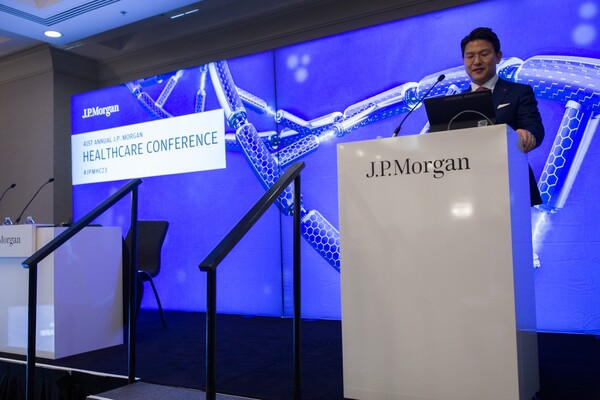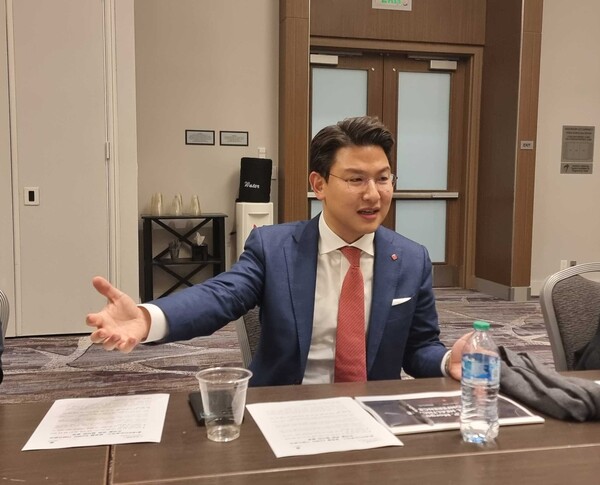SAN FRANCISCO, Calif. -- By Lee Han-soo/Korea Biomedical Review correspondent – Lotte Biologics announced its full-fledged advancement as a CDMO (contract development and manufacturing organization) and its mid-to-long-term vision at the JP Morgan Healthcare Conference’s Asia Pacific Track on Tuesday.
Lotte Biologics, a bio unit under Korea's fifth-largest conglomerate Lotte Group, caught the attention of global investors and healthcare companies after it acquired the Syracuse plant from Bristol Myers Squibb for $160 million last year. The company completed the acquisition on Jan. 1.
Despite being a newcomer in the CDMO business, the acquisition of the Syracuse plant will help the company generate revenue even in the beginning stages. According to Lotte Biologics, it expects to generate sales of up to 250 billion won ($200.4 million) this year.
However, the company does not plan to stop with the acquisition of BMS’ plant. It wants to expand its capacity by building three mega plants in Korea.

“The CDMO business is still a positive-sum game,” said Lotte Biologics CEO Richard Lee, mindful of some concerns that the CDMO market is already led by big manufacturers like Samsung Biologics.
Lee said Lotte will spend a total of $3 billion to build three mega plants in Korea by 2030.
Each facility will be engineered to be constructed with eight stainless-steel bioreactors with 15kL capacities for large-scale commercial operations alongside multiple 2kL single-use bioreactors.
Through the mega plant, the company will be able to streamline clinical drug substance (DS) and drug product (DP) services in an integrated manner to support many of the discoveries and pipelines, Lee added.
The groundbreaking is expected to take place later this year, with physical construction slated to be mechanical-ready in a 24-month timeframe, and good manufacturing practice (GMP)-manufacturing ready by 2026.
All three plants will be fully operational by 2034. The company hopes to generate $3 billion in revenue annually and an operating margin of approximately 35 percent.
To make the plant operation ready as soon as possible, the company plans to use a “cross-pollinate tactic,” which will allow Korean workers to go to the Syracuse plant, receive training for a few months, and come back to Korea to accelerate plant construction, validation, and GMP certification.
However, Lee declined to comment on where the new mega plant will be built, saying that the plan is still under review.
Lee also announced expansion plans for its recently acquired Syracuse plant.
“The site is on 90 acres of land, and currently, only 30 percent is being utilized, which gives us ample expansion room for the next decade,” he said.
The Syracuse plant aims to support single-use clinical manufacturing capabilities for antibody production, including single-use bioreactors and fill and finish services, to accommodate a diverse range of venture firms and development firms worldwide.
Another expansion plan is to expand Lotte’s competency specifically for ADC (Antibody Drug Conjugate) conjugation service as the company wants to partner with ADC development and commercial firms, hire more personnel, and build a dedicated conjugation site this year.
“Our goal is to ultimately become the most trusted ADC conjugation site in the U.S.”

At a separate meeting with reporters, Lee said the company will begin establishing its ADC service this year.
“Within this year, we will start ADC expansion. Then, we will obtain the ability to produce ADC in the first half of next year,” Lee said. “There are several vendors for ADC, and we plan to select one company and entrust them with the expansion plan.”
To speed up the ADC expansion, the company will use the site of a former animal laboratory previously used at the Syracuse plant, and change and expand it into an ADC manufacturing site, Lee added.
“The scope of our expansion isn’t just limited to Syracuse as we plan on expanding to different biotech hubs, like the Kendall Square in Boston, and San Francisco, potentially, to create business offices, expand and improve our contract development organization (CDO) capabilities, including cell line and process development, and analytical services,” Lee said.
Lee also stressed that the company will be looking at new areas such as viral vector manufacturing, mRNA-driven modalities, and cell and gene therapies, including CAR-T.
“We’re here to bring potential partners flexibility and stability, to meet their milestones, clinical timelines, and ultimately be their commercial manufacturing partner,” Lee said.
Lee explained that the company plans to do so through its “Partner Program Initiative.”
“Any companies that have a promising drug that needs clinical or commercial production, they can start manufacturing with us now,” Lee said. “We’ll find a way to get through that financial hurdle together, whether it’s with a delayed payment at minimal interest or equity stake exchange, as long as partner companies are committed to building a long-term manufacturing relationship with Lotte Biologics, we’re here to cooperate with them to the end.”
Related articles
- [2023 JP Morgan Healthcare Conference] Has interest in SD Biosensor faded as Covid becomes endemic?
- [2023 JP Morgan Healthcare Conference] Orum Therapeutics, ‘the world’s 1st’ to develop a dual precision targeted protein degrader
- [2023 JP Morgan Healthcare Conference] Investors scrutinize balance sheets, expect more M&As of biopharma
- What to expect from Korean drugmakers at JP Morgan healthcare meet?
- [2023 JP Morgan Healthcare Conference] Samsung Biologics jumping into ADC, gene therapy
- [2023 JP Morgan Healthcare Conference] ‘Investors more interested in digital health’
- [2023 JP Morgan Healthcare Conference] Investment in healthcare will rebound in 2023: JPM
- [2023 JP Morgan Healthcare Conference] ABL Bio aims to license out 2 bispecific antibodies after Sanofi deal
- SCM Lifescience to bring a first-in-class treatment for acute pancreatitis: CEO
- Lotte Biologics picks Songdo as potential site for mega plant
- What’s the solution for CDMO manpower shortage amid Samsung vs Lotte rivalry?
- 'Samsung Biologics asks Lotte Biologics to stop employee poaching'
- Lotte Biologics to offer stock options to employees in Korea
- Lotte Biologics, Excellgene to collaborate on CDO business
- Lotte Biologics takes 1st step toward building mega-plant in Songdo
- Korean pharma giants to impress investors at 2024 J.P. Morgan Healthcare Conference

